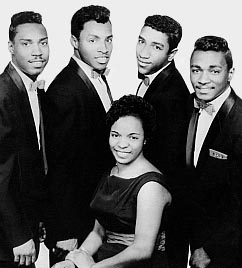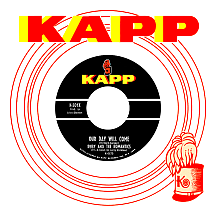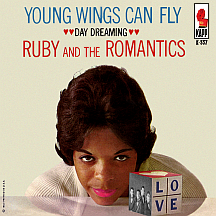RUBY AND THE ROMANTICS
Our Day Will Come
Akron, Ohio was an active place for musicians and singers in the 1950s; its population (more than a quarter of a million) was reaching a peak and its close proximity to the recording studios of Cleveland and Detroit served as inspiration for would-be stars. Even New York City, about 500 miles away, was close enough for anyone willing to take a gamble and make the trip. That's how success came about for Akron's Ruby and the Romantics...that is, after a few years had passed and many changes occurred until the just-right vocal combination of one woman and four men fell into place.
Baritone Ronald Mosely, tenor Edward Roberts and bass singer Leroy Fann had been in various local groups and by 1957 they were performing together as members of The Embers, a group that eventually changed its name to The Supremes (there were no less than three later Embers and several that used the Supremes name over the years, including one particular Motor City trio everyone knows). A single by Akron's Supremes appeared in 1960 on the Apt label, smooth ballad "Another Chance to Love" backed by an oddball dance tune, "Fidgety." The group split and the three added first tenor George Lee, the most likely choice as lead singer for the new quartet called The Feilos, a very strange name for a music act...or anything, since it isn't even a real word!
Right around this time, Ruby Nash was singing informally with her sister Betty at dances and local events in a group whose lineup changed from week to week and didn't even have an official name. She met the four "fay-lows," began singing with them, and it felt right. They couldn't have realized it at the time, but a permanent lineup had been set. At first they alternated lead singers based on the material, but that particular modus operandi was destined to change. Feeling confident, the quintet traveled to New York in the fall of 1962 and auditioned for Allen Stanton, a producer at Kapp Records; not exactly deep in rock and roll or R&B acts, owner Jack Kapp and his associates decided the group's smooth style wasn't too much of a stretch, signing them in an effort to widen the label's reach, however cautiously, to a more youthful audience. But the Feilos had to go - what kind of a name is that, anyway? - so they came up with the much more commercial-sounding Ruby and the Romantics, which described them perfectly.
New Yorker Bob Hilliard and New Brunswick, Canada native Mort Garson had each logged several years in the business composing songs together and separately. Their latest creation, "Our Day Will Come," was a song they felt had hit potential for dashing crooner Jack Jones, one of the Kapp label's new stars. Stanton decided to give Ruby and her fellows first crack, arranging it with a bossa nova beat (the hot trend of the moment) and an ingeniously unique organ accompaniment. All this and Ruby's vocals won the songwriters over and it's a good thing as it became the biggest hit of either composer's career. Released near the end of the year, it hit number one in March '63, one of the more impressive debuts for an act that came out of nowhere...or in this case, Akron.
Radio listeners couldn't resist Ruby's sweet, soulful (but not threatening to the over-30 "old" folks) vocal quality and her all-male dream team's harmonious support. Another Hilliard-Garson song, "My Summer Love," came on the heels of the chart-topper and went top 20 nationally. During the initial recording sessions, there were a few tracks that didn't include Ruby, essentially uptempo, against-type songs with George on lead and the other three backing him. The uptempo "Don't Let Him In" was released under the name George E. Lee and died a quick death; few people ever heard it and those who did, for the most part, had no idea it was a Romantics-sans-Ruby record.

"Hey There Lonely Boy," written by Earl Shuman and Leon Carr, became the next Ruby and the Romantics single, an exquisite love song that reached the top 30 in the fall. Ballads would always be the group's specialty and Ruby handled them with a soft finesse; "Young Wings Can Fly (Higher Than You Know)" is one the best of Hilliard and Garson's works, beautifully rendered by the group. Surprisingly, it stalled mid-chart late in the year. In early '64 they landed a Grammy nomination; NARAS, in its ongoing misinterpretation of musical styles, nominated "Our Day Will Come" for Best Rock and Roll Recording (Nino Tempo and April Stevens won the award for "Deep Purple").
There were other near-hits for Ruby, Ron, Ed, Leroy and George in '64 and '65 as they developed a soul music aura: Shuman and Carr's "Our Everlasting Love," Hilliard and Garson's ('Z-z-z-z-z-z-zoom-zoom...') "Baby Come Home," top 50 charter "When You're Young and in Love" (a Van McCoy song) and "Does He Really Care For Me" (a Larry Weiss-Fred Anisfield song), the latter revealing a deeper, more mature-sounding vocal by Ruby. Kapp's promotion staff failed to generate much interest in the group's next five singles and they were dropped by the label in 1967. Moving to ABC Records, R&R worked with producer Johnny Pate and gave "Twilight Time" an energetic spin, then took a more familiar approach with "This is No Laughing Matter." Three singles was the limit and they were gone after several months in '67 and early '68. One final 45 produced by Stanton came out on A&M a year later. "Hurting Each Other," penned by Gary Geld and Peter Udell, had been recorded in 1965 (in a "Lovin' Feelin'" Righteous Brothers style) by Jimmy Clanton; Ruby's rendition made Billboard's "Bubbling Under" chart in April 1969 but went no further (it later became a hit for The Carpenters in 1972).
Whether or not they realized it, many of their contemporaries were big Ruby and the Romantics fans. The quintet's hits ("Our Day" in particular) have been remade by hundreds of artists throughout the years. The Marvelettes were the first act to have success with an R&R song when they went outside Motown's usual crew of songwriters and remade "When You're Young and in Love," taking it to the top 40 in 1967. Philadelphia-based soul singer Eddie Holman's "Hey There Lonely Girl," a gender-revised version of the third Romantics hit, was a million seller in 1970. In '75, 4 Seasons lead singer and sometimes-solo act Frankie Valli made "Our Day Will Come" a hit once again.
Ruby (henceforth known as Ruby Garnett) settled in Akron, got married and raised a family. The group called it quits in 1971 and never looked back; today she's the only surviving member. It's unfortunate for her fans, and the potential fans she could have gained, and the state of music in general, that she stopped performing at that time, though after a couple of decades passed she gave in to demand and has sung "Our Day Will Come" in public on very rare occasions. For many years, Ruby worked at a Salvation Army store in the Akron area. According to patrons, she occasionally did a little informal singing to pass the time...a good reason to stop by and browse through the hand-me-downs.



